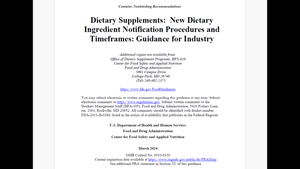I Hate Math: My Attempt to Measure Economic Adulteration
.png?width=850&auto=webp&quality=95&format=jpg&disable=upscale)
As the month comes to a close, I was hoping to conclude economic adulteration with a bang that would resonate throughout the industry.
How was I going to do that? By trying to track the retail impact of economic adulteration. Never mind that places that do this kind of statistical breakdown, like SPINS, don't have such numbers. Never mind that I don't have any formal training in any field of mathematics. Forget that I practically ran screaming from calculus my senior year of high school.
Here's the formula I developed that I thought would surely get me honored at an NPA banquet and sharing my Utah Jazz jokes with Senator Orrin Hatch.
Instead, I learned just how hard it is to track this slimy practice.
Take the amount of sales in a particular sector (e.g., sexual supplements, heart health, etc.) in the natural foods marketplace for the year prior. (In this case instance let's use, May 25, 2009 to May 25, 2010.)
After May 25, 2010 track any news appearing in a national publication, established online publication (e.g., Slate, Politico), or major TV news program involving economic adulteration in natural products.
Track the sales in the relevant sector after these stories hit. You can compare the sales in a sector to the year before, or from the point before scandal hits to sales afterwards.
I really thought I was onto something, then I came to an important realization: These numbers are worthless. Why?
They don't take into account companies that don't get caught and still put potentially dangerous products on the market, which is why economic adulteration is despised. No one's going to admit that they're committing fraud.
These numbers won't scare anyone straight or get people to change their ways. Companies will stop only when they get caught, and even that's not a guarantee.
Actually, the available data would do more harm than good. We've already outlined what's being done to stop EA, the resources that are available. Solutions are being worked on. Numbers would just cause retailers and the general public to panic, plus it'd give fodder to every uneducated industry enemy.
What if the product's sales don't dip?
My attempt to help with economic adulteration failed, but I know the industry has the right people and measures in place to keep it under control.
Clearly, my math skills won't be needed in this battle. Thank god.
About the Author(s)
You May Also Like






.png?width=800&auto=webp&quality=80&disable=upscale)